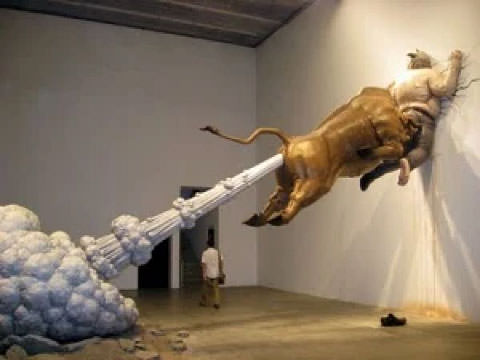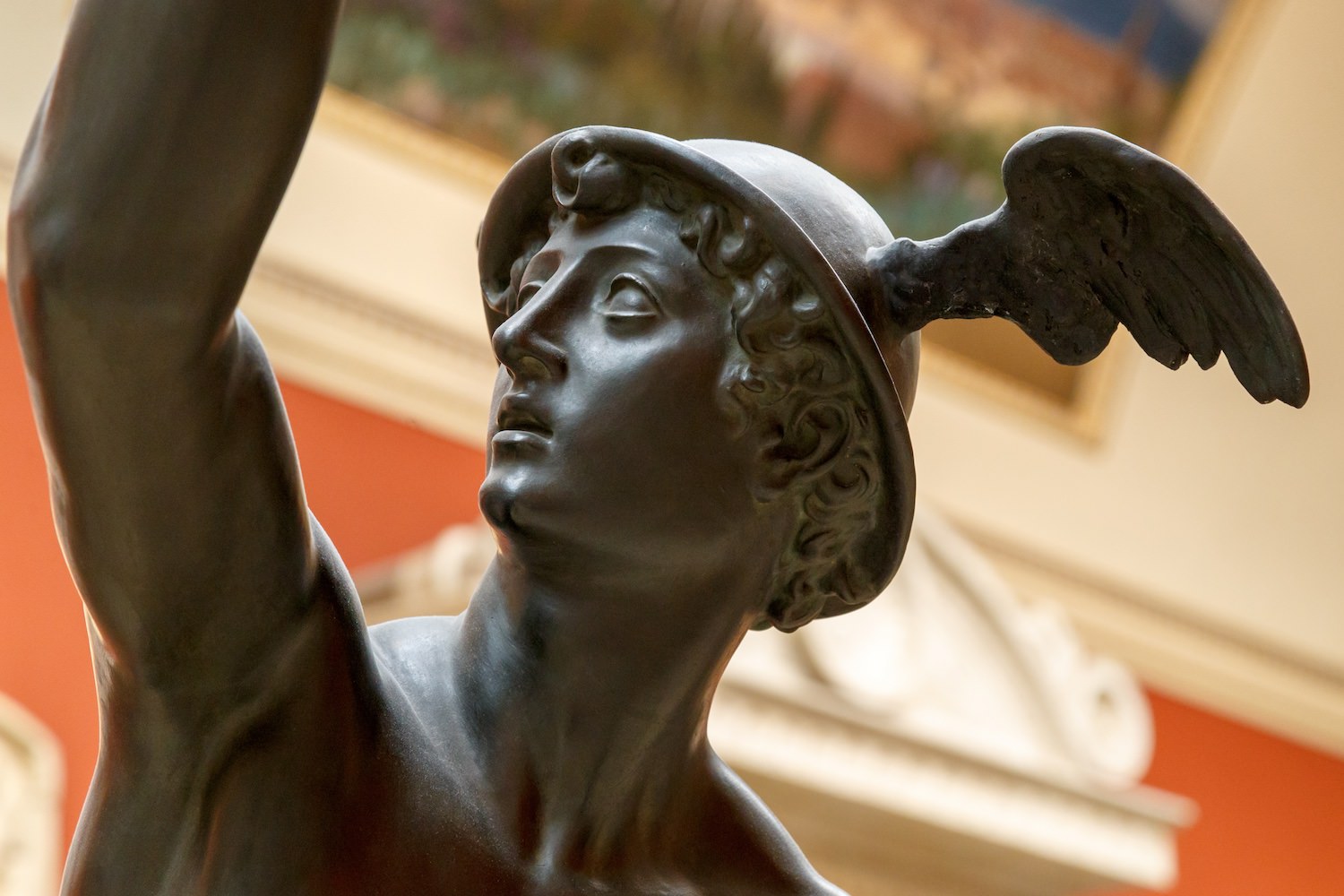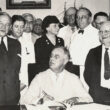GUEST ESSAY
Americans from all corners of the country are speaking out against the venality and destructive intentions of the incoming political leadership. The Spectator will periodically feature these voices from arenas outside our customary lens. Here literary scholar Randy Fertel, who has written extensively on improvisation as a taproot of contemporary culture, offers a prescription for dealing with Trumpism drawn from the core narratives and mythologies in his field.
During his run for the Republican presidential nomination in 2016, former Ohio Governor John Kasich was known as the voice of reason. Appearing recently on MSNBC’s Chris Jansing Reports, Kasich condemned President Biden’s decision to pardon his son, arguing that Biden’s decision has undermined the nation’s trust (presumably in the presidency, or perhaps public life writ large). He added, without apparent irony, that it would be left to Trump to restore this shredded bond. Trust him, Kasich seemed to say: this time the tiger will change his stripes. As with Kasich, the nation’s trust in Trump, as measured by the Pew Research Center, has gone up.
Before 2022, trust in the judicial branch typically exceeded 60%. But the nation’s trust in the scandal-ridden Supreme Court has dipped, according to Gallup, to 48%.
Forty-eight percent? Revelations of Justice Clarence Thomas’ friendship with right-wing billionaires lit up the court in an ethics inferno. Four wealthy friends treated him to luxury gifts and high-end travel — 26 private jet flights and eight helicopter flights — and covered the private school tuition for his grand-nephew. Texas real-estate magnate Harlan Crow bought the justice’s mother’s home and adjacent properties in Savannah, GA, for $133,363. Mrs. Thomas now lives rent-free.

Painting by Sharif Tarabay
This photo-realistic painting shows Clarence Thomas smoking a cigar with Harlan Crow to his left. They are joined by lobbyist-lawyers Peter “Bo” Rutledge, Leonard Leo, and Mark Paoletta.
Rutledge has filed more than 50 briefs and petitions in the Supreme Court and lower courts.
Paoletta supported Thomas’s confirmation and represented Ginni Thomas in her negotiations with the House Select Committee to Investigate the January 6 Attack. President-elect Trump recently announced he would be appointed General Counsel to the Office of Management and Budget.
Leonard Leo is co-chair of the Federalist Society board. He assisted Thomas in his confirmation hearings and led campaigns in support of the nominations of John Roberts, Samuel Alito, Neil Gorsuch, Brett Kavanaugh, and Amy Coney Barrett.
The painting, by Sharif Tarabay, hangs over Crow’s mantle at Camp Topridge in the Adirondacks. Renovated in 1923 by Marjorie Merriweather Post, former owner of General Foods and the daughter of C. W. Post, the “camp” was considered by Post to be a “rustic retreat.” It consisted of 68 buildings, including a fully staffed main lodge and private guest cabins, each staffed with its own butler.
The Mohawk warrior in the background is surely wondering what he did to get invited to this pow-wow.
Trust and the Fairness Doctrine
The FCC’s Fairness Doctrine (1949) required radio and television broadcasters to present fair and balanced coverage of controversial issues, including granting equal airtime to opposing candidates for public office. The FCC under Reagan abolished the Fairness Doctrine in 1987, arguing in a bow to Kafka that it had a chilling effect on free speech.
In rushed Rush Limbaugh with conservative talk radio, syndicated in 1988, and “Fair and Balanced” Fox News. To be fair and balanced, the Fairness Doctrine only applied to broadcast news. In 1949 cable news lay in the distant future. Limbaugh’s radio show however, was on the horizon, with its talk of FemiNazis, conspiracy theories, and the divisiveness that fed the tribalism we’ve come to know.
Confession Time
In 1990 I was Vice President of Marketing for Ruth’s Chris Steakhouses. Ruth Fertel— my mother and the founder of Ruth’s Chris—and I were locked in a family embroglio that didn’t end well. (For the curious, see The Gorilla Man and the Empress of Steak: A New Orleans Family Memoir).
But before the door hit me in the behind, as marketing director I proposed that we advertise on Rush Limbaugh. I was then an avid listener each day on my way to work, a commute often spent pounding the dash at his latest outrage. He wasn’t exactly my kinda guy, but his listeners were red meat — think Ruth’s Chris — kinda guys.
It was a good fit and it got better. When the nutritionists “woke” to the dangers of red meat, Limbaugh called the Manhattan Ruth’s Chris and had them send over a steak. If you can make it sizzle, he told them, I’ll savor every bite on the air.
He did and sales went hockey stick.
Social Media’s Social Engineering
Social media lay even further in the future. Seeming to have no purpose other than to grow the customer base and increase engagement, the new platforms laid claim to authenticity. Social media has no axe to grind, no goal but “a more open and connected society.” Surely, these communication systems are trustworthy. So they claim.
It’s the same with improv, which has been my main intellectual and cultural interest since college: free of overt purpose, just fun and games. Neither applies a thumb to the scale, neither has a bias to promote.
Improv has always promised to create community, its legacy since Hermes. The Greek Trickster, wanting to win his way onto Olympus, kills one of Apollo’s heretofore immortal Cattle of the Sun. He disrupts Apollo’s reasonable norms: after all, the cattle are both sacred and immortal. With the sacred carcasses Hermes improvises the rites of sacrifice that nurture the link between gods and men. Disrupting cultural norms, he enriches the Hellenic community.
Like Hermes, Zuckerberg also had social engineering in mind, creating global intersections amongst all those “friends.” But Zuckerberg had his thumb on the scale. He had purpose.
When Facebook reached one billion users in 2015, Zuckerberg renewed Facebook’s commitment to increasing its user base: “A more open and connected world is a better world. It brings stronger relationships with those you love, a stronger economy with more opportunities, and a stronger society that reflects all of our values.” The voice of reason.
Of course, “a more open and connected world” also meant more engagement, more data collection, more clicks. More revenue.
Surely Zuckerberg’s big tent—filled with 3 billion voices, close to one-third of the globe—would foster democracy. Yet while he was building “a stronger society,” the societies he drew from skewed autocratic and authoritarian: in 2021, Freedom House, using a measure of government accountability, counted 25 countries where democracy increased over the previous year and 60 where it declined.
After the Sandy Hook mass-murder in 2012, the parents of Noah Pozner, a six-year-old boy among the 20 children killed that day, published an open letter to Zuckerberg asking Facebook and other social media platforms for relief from the harassment and death threats from conspiracy groups. “The companies,” writes journalist Max Fisher, “dug in” (see The Chaos Machine: The Inside Story of How Social Media Rewired Our Minds and Our World, 2022). It’s not our fault, we are just a neutral platform facilitating communication.
Alex Jones helped provoke the harassment with his false flag narrative that was widely shared on the ‘net. Jones described the shooting incident as “synthetic, completely fake with actors.” Later found guilty of defamation in what for this era is a rare example of accountability, Jones was fined $1.1 billion in damages.
Asked about the problem of trust, Zuckerberg, “riffed” on the nature of free speech:
‘I’m Jewish, and there’s a set of people who deny that the Holocaust happened. I find that deeply offensive. But at the end of the day, I don’t believe that our platform should take that down, because I think there are things that different people get wrong. I don’t think that they’re intentionally getting it wrong.’
Fisher comments:
It was vintage Silicon Valley.… And, like many of the Valley’s leaders, he seemed still to be living in an alternate universe where platforms are neutral vessels with no role in shaping users’ experiences, where the only real-world consequence is that somebody might get offended, and where society would appreciate the wisdom of allowing Holocaust-denial to flourish.
Zuckerberg’s reference to “our platform,” it should be noted, is an industry-promoted term, intended to diminish the need for regulation. If they are “platforms” they are not “publishers” and therefore protected by Section 230 of the Communications Decency Act (1996), written during the Clinton presidency in the infancy of social media. Being a platform rather than a publisher provides immunity — “safe harbor” — for websites with respect to third-party content. Alex Jones promoted all that harassment. It just happened to pass through our platform. We have no responsibility.
Social media platforms are not publishers, and the Silicon Valley overlords have been determined to keep it that way. But as the volume of misinformation on social media mounted, pressure grew on Congress to make social media responsible as publishers would be for law-breaking and hate-filled content.
Monitoring outrageous content doesn’t fit the business plan. Social media’s autonomous AI algorithms lend power not to the best informed or most persuasive voices, but to the loudest, the most outrageous. The more outrageous a comedic improviser’s response to Yes, and . . . is, the better. You say a green-skinned ogre is chasing you? So too, your last Facebook post: the more outrageous, the better. The algorithm makes sure fear and rage gets more circulation. It increases engagement and doom scrolling. With his bully pulpit, Trump was the loudest of the loud.
And meticulously prepared ice-cold Russian bots on Facebook make Americans burn with a rage that has helped elect Trump twice.
The Father of Fake News, and his Bastard Son
Reagan is sometimes maligned, perhaps unfairly, as the “Father of Fake News.” The Democratic Congress passed a bill in 1987 to restore the Fairness Doctrine. Reagan vetoed it. So, if not the Father, at least a scurrilous cousin.
Certainly, Reagan is an early avatar of Modern American Conservatism. “In this present crisis,” he intoned in his First Inaugural Address (1981), “government is not the solution to our problem; government is the problem.” That elegant antithesis reflected a distrust felt widely throughout the nation.
Conservatism’s second father took flight on the wings of that first prepositional phrase: In this present crisis. The University of Chicago economist Milton Friedman saw things this way: “There is enormous inertia — a tyranny of the status quo — in private and especially governmental arrangements. Only a crisis — actual or perceived — produces real change.”
Reagan’s “present crisis” morphed seamlessly into Trump’s American Carnage and the Big Lie. “Constant lying,” Harrah Arendt explains, “is not aimed at making the people believe a lie but at making sure no one believes anything anymore…. With such a people you can do anything.” At the heart of the Big Lie lay the effort to undermine trust. If you cannot trust the media, or the judiciary, or your Facebook friends, or government, put your faith in The Strong Man who alone can fix it.
So, In Whom Do We Trust?
In a time of constant crisis, constant chaos, how do we again learn to trust?
My answer will surprise, or at least need explanation.
I say trust Trickster.
Not Trickster when he slides over to Con Man and inspires a cult. No, trust Trickster the culture bearer. Trust Trickster whose challenge to authority brings about cultural change and renewal, uniting humankind with trust in the animating spirits of the gods.
When baby Hermes kills his brother’s cattle, rageful Apollo—the sun god, the voice of reason—pulls rank and grabs him from his cradle. Hermes’ response? He farts in big brother’s face.

This Trickster, the voice of improvisation, who comes to challenge the powers-that-be, is in each of us. We saw Trickster when thousands of women wore pink ‘pussy hats’ the day after Trump’s inauguration. Happy warriors fighting for women’s rights.
We saw Trickster in the response to Yoon Suk Yeol’s declaration of martial law, a response that, like a fart, was instantaneous. And mirthful, because Yoon’s declaration was ridiculous and was treated as ridiculous. Take away our freedoms? Take away our agency? Like baby Hermes I fart in your face. That’s what I think of your power grab.
In Nicolle Wallace’s vivid description of events in Seoul, “People were in the streets, undeterred, undaunted.” Heather Cox Richardson’s Letter from an American points to journalist John Yoon’s story in The New York Times of a South Korean real estate agent who watched President Yoon’s speech, got in his car, and drove for an hour to get to the National Assembly. The man told Yoon, ‘I thought the end has come, so I came out.’”
Kudos for the real estate agent. He heard President Yoon’s call and responded without hesitation. Yes, and…
For Yale historian Timothy Snyder, the agent’s instantaneous response was meticulously prepared. The response of the South Korean people as a whole offers signposts we can learn from. While they probably hadn’t read Snyder’s On Tyranny: Twenty Lessons from the Twentieth Century, they acted spontaneously — from sui sponte, on their own accord — on what happened to be Snyder’s first of twenty lessons about tyranny. As Snyder tells Wallace on her show Deadline: White House:
Those South Koreans did not obey in advance. They didn’t obey at all. They treated the whole thing as ridiculous.
That’s something we’ve got to get through our heads. If Trump tries the Insurrection Act, one of the possible outcomes is [like Yoon] he fails, is embarrassed, and is humiliated. That’s the outcome that if you’re an American who cares about freedom you should be preparing for…We don’t want a military dictatorship and the whole idea is ridiculous.
Snyder’s twenty-first lesson could be called Trickster’s Lesson: ridicule the ridiculous. In a democracy built on the balance of powers, fart in the face of the power grabber.
Here Nicolle Wallace chimed in, offering her version of Kamala Harris’s Politics of Joy. Trumpian extremism breeds despair and paralysis, which, like the loss of trust, “are tools of the autocrat.” In Snyder’s framing, the events in South Korea demonstrate how to flip the script: Trump’s “extremism […] actually unites, […] and puts all of the citizenry in the streets, basically with some mirth, saying, you got to be f-ing kidding me…”
Vice President Harris’s campaign resisted allowing Donald Trump to steal the joy from American politics and American life. “Suddenly,” Michelle Goldberg wrote in the Times, ”a campaign that felt like a bleak death march has become fun, even exuberant.” Harris lost the election but the lesson of that joy, the mirth of her laugh, should not be lost.
Kasich, trusting that Trump of all people will restore trust, obeys in advance.
Improv is a tool we need in our kit. Faced with a power grab, don’t try to meet it in kind with equal force. Go low. Cut the autocrat down at the knees with laughter, ridicule, or, best of all a fart, metaphoric or otherwise. When a president-elect, a convicted felon, picks clowns for his cabinet who promise to tear down the intelligence community, the health care system, the military, and our democracy, laughter should be the first responder.
So now we start again. Americans once showed South Korea its bumpy road to democracy, now they show us the way….
We aim to be the powerful and resilient bull in Chen Wenling’s sculpture, not the bully whom it properly skewers.

To trust. Not to obey in advance, but instead to trust in what Toni Morrison called “an indelible hand of agency.”
A former professor of English, Randy Fertel is passionate about great stories and good causes. Kirkus Reviews called his award-winning book, A Taste for Chaos: The Art of Literary Improvisation, “A smart blend of psychology, philosophy and literary history…” About his new book Winging It: Improv’s Power and Peril in the Time ofTrump (Spring Publications), Kirkus called it “a tour de force…. A thoughtful and accessible look at how and why improvisation goes far beyond the stage, and why its power should not be underestimated….” Fertel co-founded The Ridenhour Prizes for Courageous Truth-telling in honor of the My Lai whistleblower and George Polk Award-winning investigative journalist Ron Ridenhour.




0 Comments